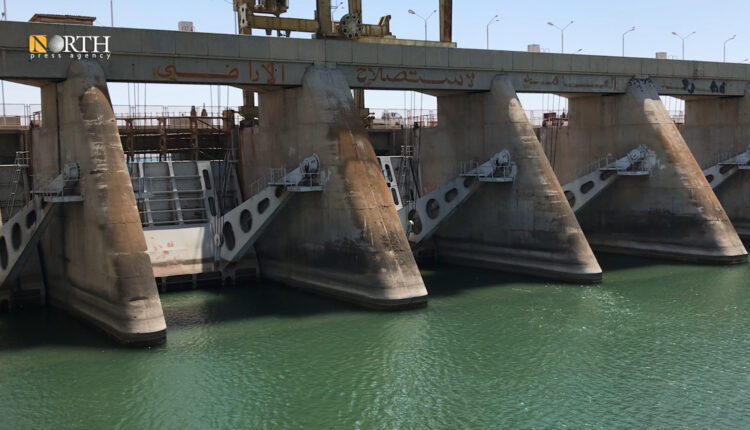Ahmad Osso, director of al-Hurriya Dam in the town of Mansoura, southwest of Raqqa Governorate, northern Syria, said on Saturday that the dam’s production decreased from 75 to 14 megawatts per hour due to the lack of water supply from Turkey.
He told North Press that the lack of water supply from Turkey greatly affected the Euphrates Dam in Tabqa, northern Syria, which in turn affected the al-Hurriya Dam, aka al-Mansoura dam.
Earlier, Imad Obaid, an administrator at the Euphrates Dam, told North Press that 3.5 billion cubic meters had been depleted of the strategic reserve of the Euphrates Dam’s lake in Tabqa.
Currently, the lake’s water level has declined to 10.5 billion cubic meters out of 14.5 cubic meters, due to its depletion as a result of the lack of water coming from Turkey, according to the official.
Al-Hurriya Dam works on regulating the course of the river and generates electricity for the region, and reserves behind it a lake with a capacity of 90 million mᵌ before the water supply decreased by Turkey.
There are three turbines in the dam, only one of which works with half the power. The other two turbines stopped working due to the lack of water supply and needed maintenance equipment, according to Osso.
Turkey has been withholding water flow in its dams since January 2019, weaponizing the Euphrates River against the Autonomous Administration of North and East Syria (AANES). The northeast regions of Syria are the most affected by Turkey’s water cut-off.
The water level of the Euphrates River has dropped by five meters recently due to Turkey’s seizure of the river’s water. The flow rate has been limited to 200 cubic meters per second, which is a serious breach of the 1987 water-sharing agreement signed with Syria and Iraq under the United Nations’ supervision.
The 1987 agreement stipulates Turkey’s permanent commitment to pumping 500 cubic meters of water per second from the Euphrates River towards Syria.

